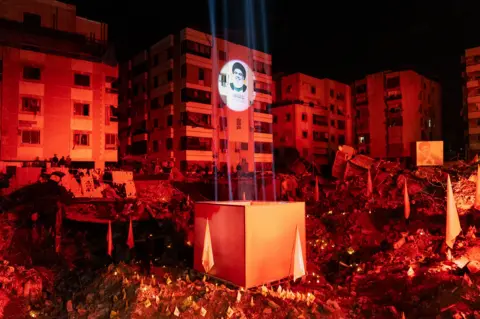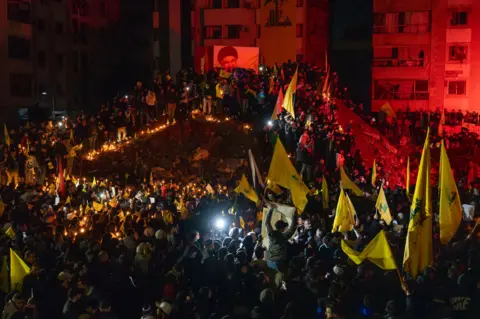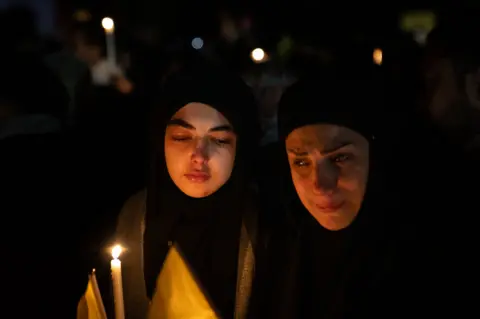 Joel Gunter/BBC
Joel Gunter/BBCThousands of people have descended on the site where former Hezbollah leader Hassan Nasrallah was killed by an Israeli air strike, after the group allowed access to the area for the first time for a public memorial.
The massive crater left by the Beirut strike was lit up in red and festooned with Hezbollah flags. At its centre, torches projected light beams into the night sky.
Men, women and children wept at the sight of the crater, while the crowd chanted “At your service, Nasrallah” – a common rallying cry among Hezbollah supporters.
Nasrallah led Hezbollah for more than 30 years as it became a formidable force in Lebanon, turning him into one of the most influential figures in the Middle East.
A ceasefire deal agreed between Hezbollah and Israel on Wednesday paved the way for the southern suburb where Nasrallah was killed, on 27 September, to be opened to journalists and the public.
The militant and political group had previously closely guarded access to the suburb, known as the Dahieh, particularly the place where Nasrallah was assassinated, which was entirely closed off.
 Joel Gunter/BBC
Joel Gunter/BBCThe Israeli strike that killed the Hezbollah leader was reportedly made up of as many as 80 bunker busting bombs, and it destroyed several residential buildings in Harek Hreik – the neighbourhood that forms the centre of Hezbollah’s operations in Beirut.
When the crowd was granted access to the site for the first time on Saturday night, people surged into the open area left by the destroyed buildings and climbed up around the edges of the crater.
Many held aloft candles and pictures of Nasrallah, who was 64, while a speech by the former leader played from a sound system.
“For these two and half months we have refused to believe that he is really gone,” said Narjis Khshaish, 31, who wept and clutched a candle.
“We have all just been waiting to reach this place to receive his blessings,” she said.
 Joel Gunter/BBC
Joel Gunter/BBCMoussa Dirani, 57, brought his teenage son to the memorial event. “It is very sad and painful to see this site,” he said. “But the resistance does not stop with Nasrallah, his death gives us power to continue along his path.”
The hundreds of Hezbollah flags at the event would “continue to fly high”, said Fida Nasreddine, 34. “We are with Hassan Nasrallah until the last breath,” she said.
Nasrallah’s assassination shocked Lebanon and the wider world when the news broke in September. He had rarely been seen in public since Hezbollah’s 2006 war with Israel, and was protected by tight security at all times.
He was one of a number of senior Hezbollah figures killed by Israel in air strikes between September and the ceasefire agreement struck on Wednesday.
The group had been badly damaged by the assassinations, but the sense of celebration in the Hezbollah-dominated areas of Beirut “cannot be dismissed as insincere”, said David Wood, a Lebanon analyst with Crisis Group.
“The achievements that Hezbollah has promoted – maintaining its ground operations against Israel, ensuring that tens of thousands of Israelis couldn’t return to their homes, and having a severe impact on Israel’s economy, I don’t think those achievements are nothing, and I think lots of its supporters will see an element of victory in that.”
Additional reporting by Joanna Mazjoub.


































